Can Babies Drink Cold Formula?
46 hours of research 4 minute read

As a parent of an infant, making the right feeding choices for your baby can be extremely overwhelming. Making a choice to feed formula for your little one is a major decision. Since many parents spend so much time feeding their little ones, there may be many questions, including “can a baby drink cold formula?”
It is entirely safe for a baby to drink cold formula or breastmilk. As long as your baby is happy and healthy, there is no need to be concerned about giving your little one the formula straight from the refrigerator. However, if your baby is used to being fed warm formula milk, it may be difficult for them to take the cold bottle of milk.
If a baby can drink cold formula, why is it suggested to warm the water first? Can all babies easily drink cold formula? Is cold formula safe for my baby? Here we’ll cover all these questions so that you can make healthy feeding choices for your baby.
Is Cold Formula Good For Your Baby?
For the sake of saving time, many parents prepare formula bottles for the next day and store them in the refrigerator. Although this is a time-saving strategy, it is essential to remember that prepared formulas should be used within 2 hours. This prevents bacteria buildup.
When it comes to feeding the baby, some parents just give the formula to the baby without waiting for the formula bottle to warm up. Drinking the formula cold or warm all the time could possibly be a learned preference for the baby. To check your baby doesn’t mind drinking cold or warm formula, you can serve the bottle with warmer or colder variations.
But is it true that your baby’s stomach can get upset with cold formula? No, it isn’t. The chances are your baby might enjoy drinking cold formula, especially when he/she is teething (more info on that to come!).
Many parents might not want to give formula straight from the fridge when they have a “newborn” baby; their digestive system may not tolerate it. Therefore, you can try taking the chill off from the bottle by placing the bottle in a bowl filled with warm water or running warm water over it in the sink for a few minutes.
If your baby is four to six months old, cold formula may be the preferred choice for the baby. Just observe your baby and how they respond to warm or cold formula.
An important thing to consider: your baby may be okay with the cold formula, but he/she may like the cold nipples of the bottle. For this, try placing the nipple under running warm water or placing the bottle in the fridge with a top before serving the baby.
Many parents give their baby the formula warmed in the microwave. This needs to be stopped because research has shown that warming up the bottle in the microwave generates hot spots in the milk, which can burn your baby’s mouth and throat.
Let’s have a look at the pros and cons of giving your baby the cold formula.
Pros Of Giving Cold Formula To Your Baby

1. Avoiding The Risk Of Overheated Milk
Feeding your baby a cold formula overcomes the risk of overheating the formula. Incorrect heating leads to overheating the formula, creating hot spots and destroying essential nutrients. When you choose to give your little one a cold formula bottle, you always know that you are feeding your baby in a safe manner.
2. Giving Cold Milk Is Faster
Although it does not take very long to warm the bottle of formula milk, when you multiply that by the number of bottles fed per day, the time adds up. Filling formula milk into the bottle straight from the refrigerator reduces the time to get the formula milk ready.
3. It is Easier to Travel
As a parent, you already know how challenging it can be to leave the house with a baby. Feeding the baby makes it even harder for you while traveling because you have to ensure that your baby’s formula bottle is all prepped and appropriately stored. You also worry about when and how to feed your baby while you’re out. Not having to warm the bottle makes things a lot easier.
Cons Of Giving Cold Formula To Your Baby
1. Cold Milk Is Not An Optimal Choice For Preemies
For full-term, healthy babies, it is nothing unsafe about feeding your baby cold formula. But for premature babies, parents should warm the milk prior to feeding. In newborn intensive care units (NICU), it is a normal practice for nurses to feed babies warm milk. Since preemies have a very low birth weight, feeding cold formula causes changes in their body temperature.
However, there is no confirmed evidence on whether a cold formula is unsafe for premature infants or not. Therefore, it would be good for you to discuss this with your baby’s pediatrician.
2. Your Baby Might Refuse Cold Formula
This is one of the most important things to consider while giving your baby the cold formula. If your baby has always been fed warm formula milk, the chances are they may refuse to drink cold formula, followed by extensive crying.
3. Risk of Bacteria-buildup
Opting to store and refrigerate the formula before using adds an increased risk of bacteria contamination due to cold milk storage. You can try to avoid some of this by always fully closing the bottle and never leaving it exposed and open to potentially come in contact with other food that may be in your refrigerator.
Top Formula Options for Cold Feeding
When deciding whether to feed your baby cold formula, it's equally important to choose a high-quality formula that meets their nutritional needs and supports their overall health. Options like HiPP Dutch, Holle Goat Dutch, and Kendamil Organic are excellent choices, each offering unique benefits such as organic ingredients, easy digestibility, and essential nutrients. Whether served cold or at room temperature, these formulas ensure your baby receives the best possible nutrition without compromising on quality.
1. HiPP Dutch
✓ 100% Organic Formula
✓ With added prebiotics and probiotics that supports healthy digestion even when fed cold
✓ HiPP's most popular formula
Check PricePopular With Parents Because: HiPP Dutch significantly exceeds all European Union requirements for organic certification. To help kick start a healthy gut microbiome, HiPP Dutch imitates natural breast milk by having added prebiotics and probiotics, alongside immuno-boosting galacto-oligosaccharides originating from organic lactic acid bacteria cultures. Its organic ingredients ensure that you can feed it cold or at room temperature with confidence, knowing that your baby is getting optimal nutrition every time.
✓ Demeter Certified (Organic++)
✓ Easy-to-digest goat milk formula suitable for cold and warm feeding
✓ Popular for babies with sensitivity to cow's milk
Check PricePopular With Parents Because: Holle Goat Dutch is a trusted alternative for parents seeking a gentle formula for babies with cow's milk sensitivities. It is made from Organic Whole Goat's Milk, which closely replicates the protein composition of natural breast milk and is enriched with lactose for easy digestion. Additionally, Its suitability for being served cold or at room temperature makes it a convenient choice for busy parents, providing reassurance that your baby is receiving the best possible nutrition.
✓ Made from Organic Cow's Whole-Milk Safe for Cold Feeding
✓ Vegetarian-friendly (Contains Plant-Based DHA and ARA)
✓ EU and British Soil Association Certified Organic
Check PricePopular With Parents Because: Kendamil Organic is beloved by parents for its commitment to wholesome, organic ingredients and sustainable practices. Its gentle formula is free from palm oil and GMOs and exclusively utilizes organic cow's whole-milk to create a lactose-based infant formula that closely mimics natural breast milk. This makes it an ideal choice for parents seeking a high-quality, long-lasting formula option that can be fed cold or at room temperature, ensuring your baby receives optimal nutrition.
What If The Idea Of Feeding Cold Formula Backfires?
With the pros and cons of feeding your baby cold formula mentioned above, you have probably realized that giving your little one a bottle of cold formula isn’t always the optimal choice. If this idea backfires, we suggest you choose the option of warming up the formula bottle in a bowl of warm water. It will require one or two feedings to determine whether your baby will accept it or not.
What Should You Do If Your Baby Doesn’t Drink Cold Formula?
If your baby needs to be fed warm milk, you should warm the formula milk by running it in the warm water or placing it in a bowl of warm water until the milk inside the formula bottle warms up. Try testing the temperature of formula milk by placing a few drops on your wrist. If it feels neutral, it means the formula milk is not too warm and not too hot.
Boiling Water For Your Baby
If you’ve ever seen the “formula preparation guide” section on the formula package, you might have noticed that the first step to preparing the formula is to boil the water. It is because boiling the water kills harmful microorganisms, including bacteria present in the water. Babies are more sensitive to these microorganisms. Therefore, boiling the water for your little one’s safety is highly advised.
Bottle Warmers For Heating The Formula

Bottle warmers may be the best portable option for heating your baby’s formula bottle to the “perfect temperature” that your baby desires.
Bottle warmers are a good option because you always know that your little one’s formula milk is never overheated. They are portable and easy to use, keeping a charge for more than 12 hours. It means that you can warm up the formula bottles all day long without any hassle.
Frequently Asked Questions
Can I Mix Cold Formula with Warm Formula?
Yes, you can mix cold formula with warm formula to achieve a temperature that your baby prefers. Always check the temperature of the mixed formula before feeding to ensure it is safe for your baby.
Does Cold Formula Upset Baby's Stomach?
In most cases, cold formula does not cause stomach upset in babies. However, it's important to pay attention to your baby's cues. If they seem uncomfortable or refuse the cold formula, warming it slightly may be a solution.
How Should I Store Prepared Cold Formula?
Store the prepared cold formula in the refrigerator and use it within the recommended timeframe. Follow the formula manufacturer's guidelines for storage and usage to ensure its safety.
Can Babies Drink Cold Breast Milk?
Yes, babies can drink cold breast milk. Breast milk can be offered cold to babies, and it's often a matter of personal preference. Always ensure proper storage and hygiene practices when serving cold breast milk.
Can Newborns Drink Cold Breast Milk?
Newborns, especially premature ones, are generally advised to avoid cold breast milk. As your baby grows and becomes accustomed to feeding, you can gradually introduce breast milk at a cooler temperature.
The Final Verdict
Since the cold formula is safe for your baby and is according to their preferred temperature, it is safe to give the formula to your baby that way. Newborns, especially premature infants, should not be fed formula straight from the refrigerator, but once your little one is past the newborn stage, it is entirely safe to introduce cold formula to them unless it is prepared with boiled water.
To conclude, always remember not to force your baby to drink cold formula if they cry or refuse to drink it. As a parent, it is crucial to keep your infant happy and healthy. Therefore, it is better to spare a few extra minutes from your routine to warm up the formula before feeding your baby.
Since every parent wants their baby to grow up strong and healthy with organic baby formula, Organic Life Start has a wide range of formulas to offer. We deal in selling organic formulas from trusted European brands, like Holle, Lebenswert, HiPP, and Kendamil. Still feeling a little unsure? Reach out to us so we can help you find the right formula for your little bundle of joy!
3 Most Popular Formulas That Can Be Reheated
Organic Life Start is committed to providing accurate, reliable, and trustworthy information to parents and caregivers. We carefully choose credible sources and follow a meticulous fact-checking process to uphold the highest standards in infant nutrition and parenting advice. To learn more about our dedication to accuracy, please explore our editorial guidelines.
Link To Sources


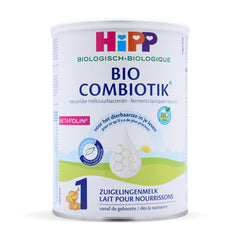

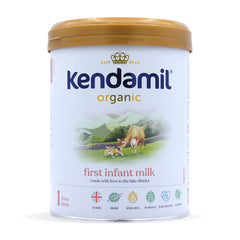
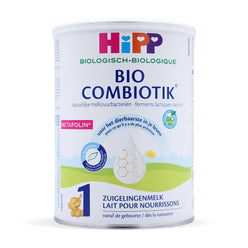
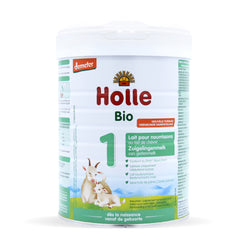
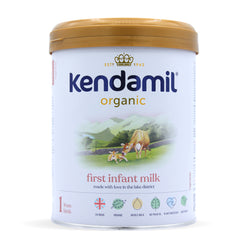
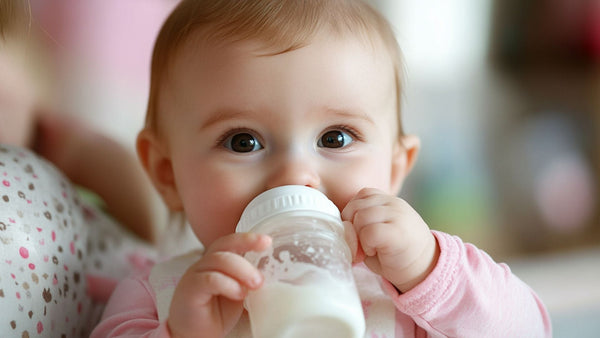





Shaina -
I always worry about whether giving my baby cold formula could upset their stomach, affect feeding comfort, or lead to digestion issues compared to warming it up first — especially since I’ve read mixed opinions and seen different preferences among babies. Does anyone else feel the same way?
Kaylee -
January 03, 2026
Will cold formula harm my baby? I’m a working mom, and every minute counts. If a cold formula is okay, I’d love to prepare it in advance.
Ermias -
December 07, 2025
I had no idea that cold formula could affect a baby’s digestion! I always figured it was just a matter of preference.